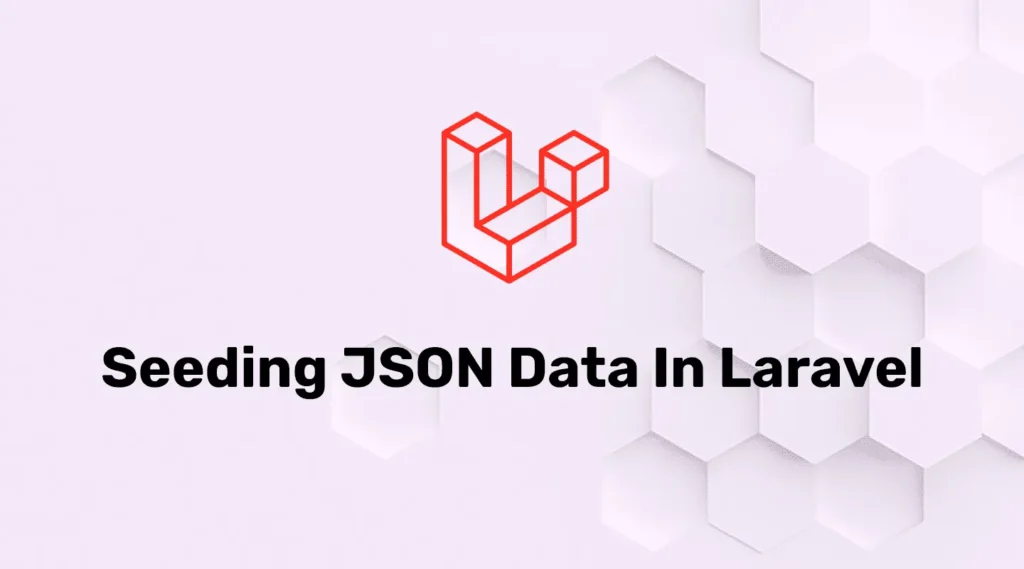Suppose we have created a JSON file for a particular task like a country list and we need to use it at multiple locations and process some operations like sorting, searching, filtering, etc. In Laravel, we can efficiently Seed JSON Data in Laravel into the database, which allows us to handle it more easily and save processing time compared to using files.
Converting JSON Data into the database is a hard process only if we approach it manually, but with Laravel seeders, we can automate this and add data dynamically whenever required.
Let’s assume your application is running and the database is configured.
Create or Download JSON file
In this application, we need a JSON file that contains country names and codes. You can download it online or create a new one. You can add this file at any location.
Here we will create a new directory into the database directory by JSON name and move our JSON file in it.
Create Model & Migrations
To store JSON data from a file we need a model. So let’s create a model using the below command:
php artisan make:model CountryCode -mIt will create CountryCode.php at App\Models Directory.
<?php
namespace App\Models;
use Illuminate\Database\Eloquent\Factories\HasFactory;
use Illuminate\Database\Eloquent\Model;
class CountryCode extends Model
{
use HasFactory;
protected $fillable = [
'name',
'dial_code',
'code',
];
}While creating we have passed -m so it will create a migration file with it. Open the migration file and make relevant changes.
<?php
use Illuminate\Database\Migrations\Migration;
use Illuminate\Database\Schema\Blueprint;
use Illuminate\Support\Facades\Schema;
class CreateCountryCodesTable extends Migration
{
public function up()
{
Schema::create('country_codes', function (Blueprint $table) {
$table->id();
$table->string('name');
$table->string('dial_code');
$table->string('code');
$table->timestamps();
});
}
public function down()
{
Schema::dropIfExists('country_codes');
}
}As per migration, we have created three new columns besides id, created_at, and updated_at columns: name, dial_code, and code.
To run migration execute the given below command into a terminal:
php artisan migrateIt will generate a database table by name country_codes.
Create Seeder
In this step, we will create a seeder for our model and write logic to read JSON files and insert JSON file data into our database. To create a seeder enter the below command into a terminal :
php artisan make:seeder CountryCodeSeederThe above command will create a database/seeders/CountryCodeSeeder.php file in your application. Let’s make some as per requirement :
<?php
namespace Database\Seeders;
use App\Models\CountryCode;
use Illuminate\Database\Seeder;
use File;
class CountryCodeSeeder extends Seeder
{
public function run()
{
CountryCode::truncate();
$json_data = File::get("database/Json/CountryCodes.json");
$countries = json_decode($json_data);
foreach ($countries as $key => $value) {
CountryCode::create([
"name" => $value->name,
"dial_code" => $value->dial_code,
"code" => $value->code
]);
}
}
}As per logic, first of all, it will read JSON files using File. Then it will use the json_decode() function to convert JSON data into an array so we can loop through it. At last, it will create records using a loop into our CountryCodes model.
Seeding Data into Database
We can directly run our seeder but setting our seeder into Database Seeder is best practice in an enterprise application. So will register it into our DatabaseSeedder.
<?php
namespace Database\Seeders;
use Illuminate\Database\Seeder;
class DatabaseSeeder extends Seeder
{
public function run()
{
$this->call([
CountryCodeSeeder::class,
]);
}
}Finally, We have created our seeder and it’s time to seed our database. Enter the below command into a terminal :
php artisan db:seedIf you don’t want to register it into Database Seeder then you can simply run the below command into your terminal and seed data :
php artisan db:seed --class=CountryCodeSeederConclusion
In this guide, we showed how to efficiently seed JSON data into your Laravel database using a custom seeder. Automating the process of importing structured data such as country codes makes development faster and keeps your project consistent. This method saves time and improves maintainability using Laravel’s built-in seeding features.
For more advanced data population techniques, you can explore Database Seeding in Laravel With Example to see how to seed your database efficiently and handle complex data structures beyond JSON files.

